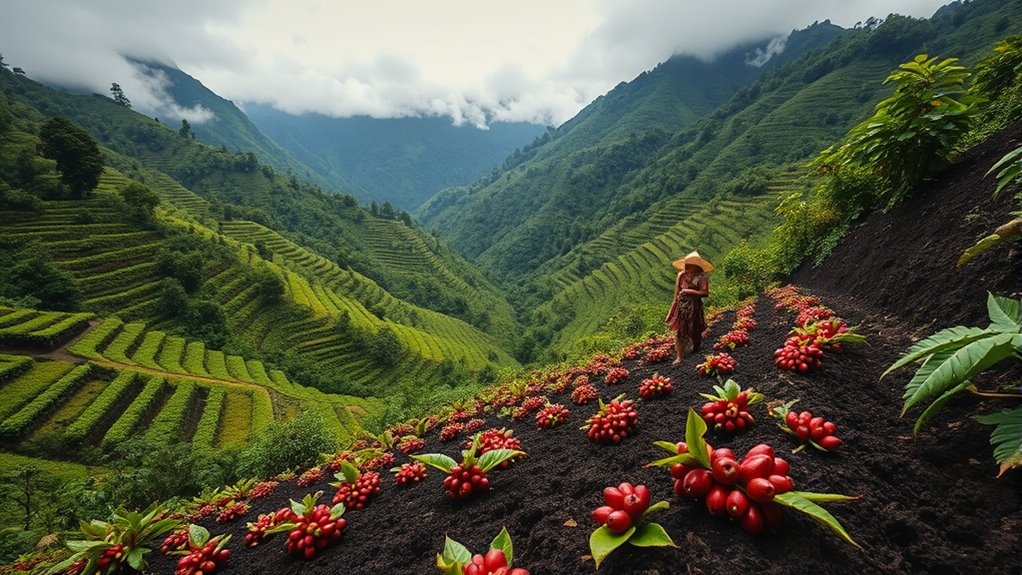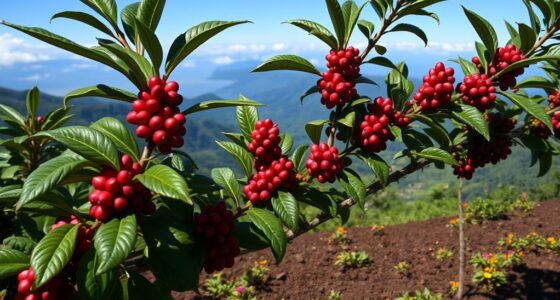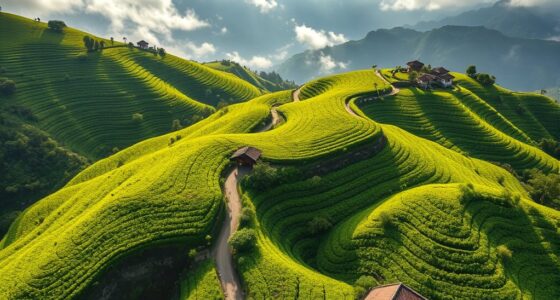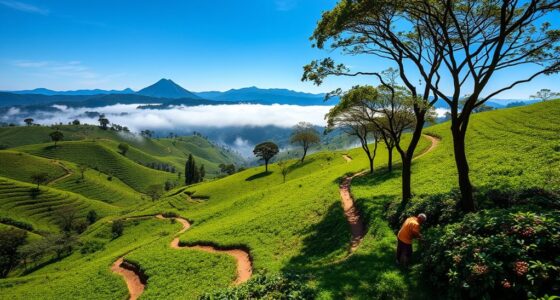In the remote highlands of Papua New Guinea, you find coffee grown on terraced slopes with rich volcanic soil and high-altitude conditions. This environment creates vibrant, full-bodied beans with unique, complex flavors and bright acidity. Traditional cultivation and brewing methods preserve their natural qualities, resulting in a rich sensory experience. Each cup reflects the rugged landscape and cultural heritage, offering an authentic taste that’s truly one of a kind. Discover more about this extraordinary coffee journey.
Key Takeaways
- Grown in remote high-altitude mountain terraced slopes, enhancing bean quality and flavor complexity.
- Volcanic soil imparts rich, full-bodied, and distinctive flavor profiles.
- Traditional cultivation by smallholder farmers preserves cultural practices and sustainable methods.
- Unique flavors feature vibrant acidity, complex aromas, and smoky undertones from open-flame roasting.
- Brewing methods like long drip and cloth filters highlight the coffee’s natural, authentic qualities.
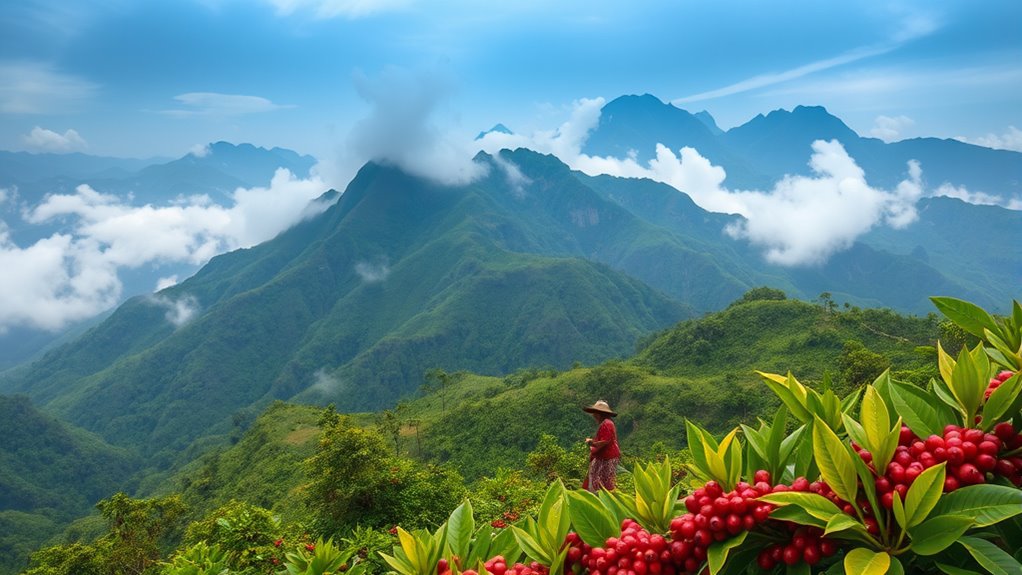
Nestled in the rugged mountains of Papua New Guinea, the country’s coffee farms produce some of the most distinctive and sought-after beans in the world. As you explore this remote land, you’ll discover that coffee cultivation here isn’t just about planting beans; it’s a deeply rooted tradition passed down through generations. Smallholder farmers carefully tend to their coffee plants on terraced slopes, using methods that respect the land and the climate. The high-altitude environment, combined with volcanic soil, creates ideal conditions for growing coffee that’s rich, full-bodied, and bursting with unique flavor notes. You’ll notice that these beans often have a vibrant acidity paired with complex aroma profiles, making Papua New Guinea coffee stand out among others globally. Growing conditions play a crucial role in shaping the coffee’s exceptional qualities and flavor diversity. This dedication to quality is reflected in the specialized farming practices employed by local growers to maximize flavor and sustainability.
In Papua New Guinea’s highlands, traditional smallholder farms produce vibrant, full-bodied coffee with unique flavor and aroma profiles.
When it comes to brewing, traditional methods remain central to local culture. You might observe villagers preparing their coffee with methods like the “long drip” or using simple cloth filters, which have been used for centuries. These traditional brewing techniques emphasize patience and attention to detail, extracting the full depth of flavor from each batch. As you sip the coffee, you’ll taste more than just its robust profile—you’ll experience a connection to the land and the people who have cultivated and brewed it for generations. This process guarantees that the coffee’s natural qualities are preserved, offering an authentic taste that reflects the region’s rugged beauty.
The act of traditional brewing isn’t just about making coffee; it’s a communal ritual that brings people together. Whether during early mornings or social gatherings, the slow preparation and shared sip foster a sense of community and heritage. The process often involves roasting beans over open flames, which imparts a smoky undertone that complements the coffee’s inherent fruitiness and earthiness. This method of preparation highlights the importance of preserving customs while celebrating the distinctiveness of Papua New Guinea’s coffee culture.
As you explore more deeply into Papua New Guinea’s coffee scene, you’ll realize that every cup is a tribute to resilience, tradition, and the exceptional terroir of the highlands. The combination of meticulous coffee cultivation and time-honored brewing techniques creates a beverage that’s more than just a caffeine boost; it’s an experience rooted in history and nature. Whether you’re savoring a freshly brewed cup in a local village or exploring the story behind each bean, you’ll understand why Papua New Guinea coffee continues to captivate coffee lovers around the world.
Frequently Asked Questions
How Sustainable Are Papua New Guinea Coffee Farming Practices?
You might wonder how sustainable Papua New Guinea coffee farming practices are. They generally aim to minimize environmental impact by using traditional methods and shade-grown techniques. Certification programs, like Fair Trade and Organic, help guarantee eco-friendly practices and fair labor conditions. While some farmers adopt sustainable methods, others face challenges due to limited resources. Overall, the sustainability varies, but growing awareness and certifications are pushing the industry toward more environmentally responsible practices.
What Are the Main Challenges Faced by Local Coffee Farmers?
You might think local coffee farmers face simple challenges, but they deal with complex issues like crop diversification and pest management. These obstacles threaten their yields and income, especially in remote areas with limited resources. Despite these difficulties, farmers adapt by diversifying crops to reduce dependency on coffee and employing integrated pest management techniques. Recognizing their resilience underscores the importance of supporting sustainable practices to ensure long-term success.
How Does Altitude Affect the Flavor Profile of the Coffee?
Altitude effects play a significant role in flavor development, and when you grow coffee at higher elevations, you notice more complex and vibrant flavors. The cooler temperatures slow bean maturation, allowing intricate sugars and acids to develop fully. This results in a brighter, more nuanced cup. So, as you experience coffee from higher altitudes, you’ll find a richer, more layered flavor profile that truly highlights the unique qualities of the beans.
Are There Any Traditional Methods Used in Coffee Processing?
You’ll find traditional coffee processing involves unique fermentation techniques that influence flavor, often using natural or wet fermentation to enhance complexity. Drying methods also play a key role; sun-drying or shade-drying are common, helping preserve the beans’ distinct qualities. These methods reflect local customs and environment, giving the coffee its special character. Embracing these traditional techniques results in a richer, more authentic flavor profile in every cup.
What Initiatives Support Fair Trade and Farmer Livelihoods?
Imagine a sturdy bridge connecting farmers’ hard work to fair rewards. You’ll find fair trade certifications acting as that bridge, ensuring farmers get fair prices and better living conditions. Farmer cooperatives strengthen this connection, empowering growers to support each other and negotiate better deals. These initiatives create a ripple effect, uplifting communities, protecting traditions, and fostering sustainable growth, so you can enjoy coffee that’s not only rich in flavor but also rooted in fairness and respect.
Conclusion
Just like a hidden treasure tucked away in the remote highlands, Papua New Guinea coffee invites you to explore its unique flavors. Each sip reveals a story of rugged landscapes and vibrant traditions, waiting for you to uncover. As you savor this rare gem, remember that great coffee, like a precious jewel, requires curiosity and courage to find. Embrace the adventure, and let each cup be a reminder of the world’s extraordinary secrets waiting to be discovered.
